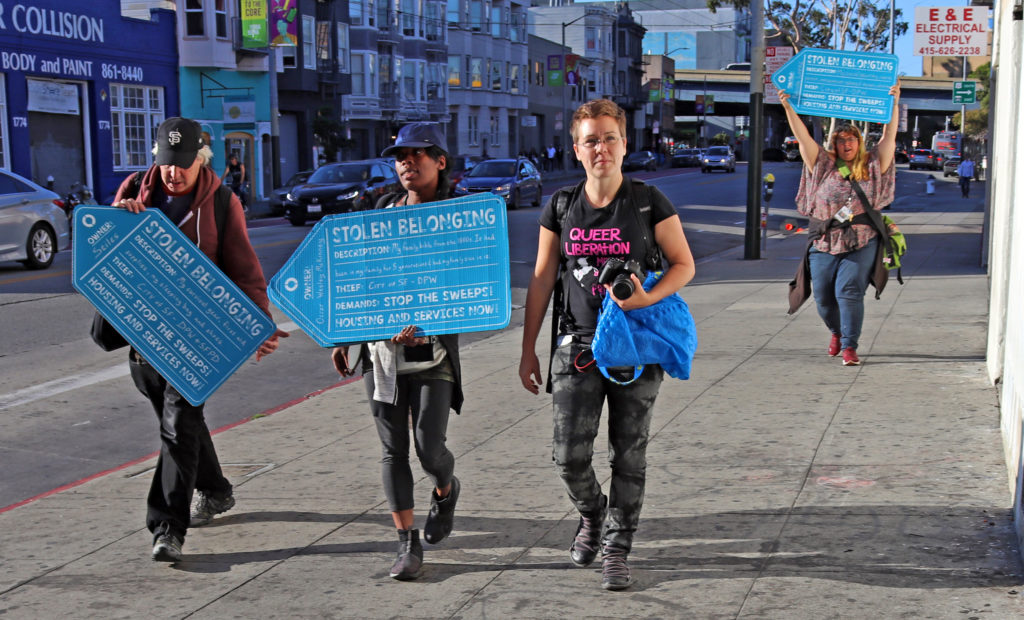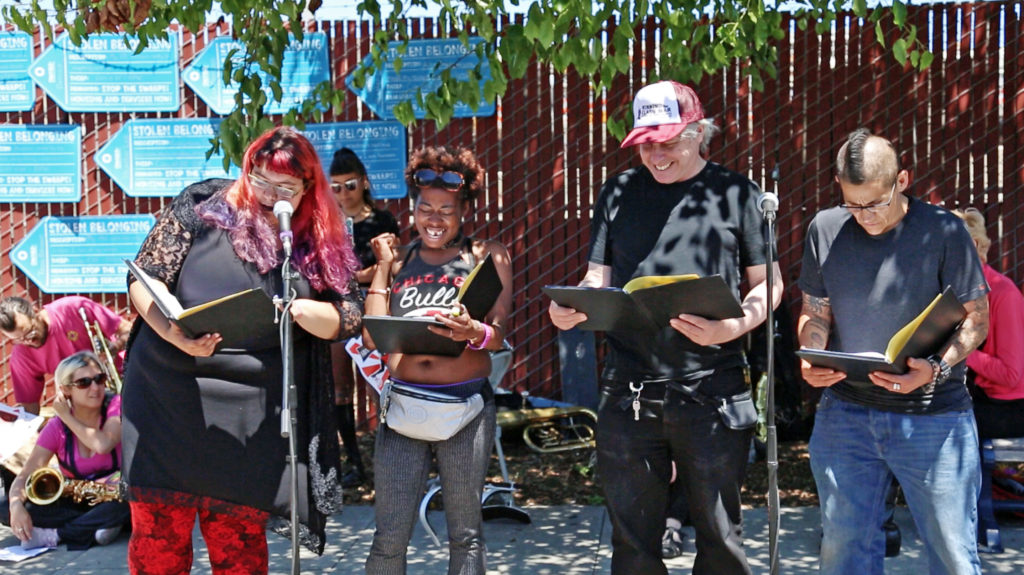By the project’s core team members: TJ Johnston, Shanna Couper Orona, Meghan “Roadkill” Johnson and Sophia Thibodeaux
Performed at the Stolen Belonging: A Public Reclamation action at the DPW yard, June 22, 2019
Edited by artist Jadelynn Stahl in collaboration with the Stolen Belonging team through a series of creative writing workshop, using interviews taken by Leslie Dreyer of each team member
TJ: My name is TJ Johnston. I work as a reporter and assistant editor of the Street Sheet at the Coalition on Homelessness, and I’ve been living in San Francisco for over 24 years now.
Couper: My name is Couper Orona. I’m a San Francisco resident and a disabled firefighter. I’ve been an unsheltered resident for 13 years of my 46 years in existence, and right now I’ve been unsheltered for almost three and a half years.
Roadkill: My name is Meghan Johnson, and I go by Roadkill. I’m f***ing Roadkill. I identify as a San Francisco native, born and raised in the Mission. I’m 25 years old and I hope to have another 25 years in the city without being displaced.
Sophia: My name is Sophia Thibodeaux. I am a volunteer at the Coalition, and a former shelter monitor for Dolores Street Shelter. Off and on, I’ve lived here about 20 years. I’m looking for my own place and it’s hard with two kids in the city. I’m happy to be a part of this project so we can make beautiful change.

Couper: The Stolen Belonging Project is documenting people’s stories of things that they’ve lost due to the city’s negligence. DPW and the police, they do these things called sweeps where they go along and they take people’s stuff. They throw it in the trash. People have lost some things that can never be replaced.
TJ: We’re talking about prized possessions, family heirlooms, personal mementos that are being snatched by the Department of Public Works, aided and abetted by the police department.
Sophia: They got their belongings taken and there was no bagging and no tagging. And there were things that they couldn’t get back, like their parents or kids ashes and the photos and all those things that you get to hold dearly in your homes, housed people.
Couper: I’ve seen them cutting tents. I’ve seen them ripping things out of people’s hands, who are trying to save the little bit of belongings they have left.
Roadkill: This project is really important to me because I have faced homelessness since I was 17, and I understand the feeling of having my sh** stolen. So that’s why this hits heart.
Sophia: It’s a really hard thing, you know, trusting in the city that your stuff will be safe and now you don’t have anything.
TJ: For one thing – for a start – no one should have to live on the street to begin with. Something that a lot of people don’t realize is that 70% of homeless San Franciscans used to be housed here until some event had happened, whether it’s an eviction, a loss of a job, end of a relationship, or hospitalization.
Roadkill: Housie people need to understand that there are a lot of unforeseen circumstances that cause us to become homeless, and that it can be any one of them at any given time.
Sophia: Homelessness isn’t a crime, so you shouldn’t treat us like we’re criminals.
Couper: San Francisco lies. They’re lying to the public. They’re lying to the people out here, you know, the bag and tags, the taking the stuff to the DPW yard. When we’ve gone out, there are stories upon stories, stories, stories, stories. No one’s ever gotten their stuff back. Ever.
Roadkill: People are afraid to come forward with things for fear of having some form of retaliation – from not being believed to getting arrested.
Sophia: It’s hard dealing with everyday city cops and how they look at you, just profiling you, assuming you’re on drugs and things like that, you know.
TJ: What the city workers are doing is a human rights violation. This is the kind of thing that you hear about in a dystopian science fiction setting, not San Francisco 2019… or maybe we have become that dystopic science fiction setting.
Couper: You see people with a lot of stuff. Well, we’re unsheltered residents, so, yeah, we have stuff. That stuff isn’t trash. That’s people’s lives. The last little bit of hope, their structure, their stability, that’s who they are.
Roadkill: Housies need to understand that everyone has a human right to housing. Everyone has a human right to mental health services. Everyone has a human right to medical.
TJ: I mean, if any of this happened to a housed person, you can be damn sure that there would be some kind of consequence.
Couper: San Francisco doesn’t realize they’re destroying people from the inside out and they’re not giving a f***. And they wonder why people aren’t going into navigation and they wonder why people aren’t going into shelters. For what?
Roadkill: A lot of people end up suffering from depression and mental illness after a sweep, because the things that were stolen from them used to keep them grounded.
Sophia: I would just like to ask a housed person: how would you feel if I go in your house and just take something, not even of value, but something that’s been in your family for ages and eons? How would you feel, you know, if I just opened the door and took it?
Couper: City of San Francisco – what you’re doing is some f***ed up sh**. You’re treating people like they’re nothing. Like, how dare you? Where does your heart go?
TJ: This is a story that needs to be told – street people having their stuff taken away by a city that’s supposed to care for them or look after them.
Sophia: We need more housed people to be proactive, to stop a sweep when it’s going on or record it, so we can have more evidence of what’s really going on in our city.
Couper: Different people we’ve interviewed, the one thing that pops up when they’re telling their story: while there is no way for the city to compensate them for the belongings that were stolen from them, if the city would stop the sweeps, if their loss can make someone else not lose something, then at least there would be some meaning behind the pain they have experienced.

Roadkill: So, first things first, just stop the sweeps. Stop taking people’s belongings. Just stop stealing their sh**.
TJ: It is important that we shed a light on what’s happening right now.
Roadkill: Nobody’s ever gonna change anything if they don’t hear our voices. And we need to stop snuffing our voices for public comfortableness. Like f*** that, you know? We’re not comfortable day-to-day being homeless. I’m not comfortable taking my kids to a shelter today, you know?
Sophia: Ms. Breed, we need to do something serious about this issue. It’s been an ongoing issue for many years and it needs to stop. Now.
Couper: We can collectively hold the city accountable by making it matter. Make this matter. For the people we’ve interviewed for this story and this whole project – they matter and their voice matters. They’re actually part of this city, they’re the heartbeat. And they want to beat just as much as a housie.
Roadkill: We need the city to feel this pain and feel this anger and feel this hope to get them to stop. Because it’s not going to stop until we get them to realize, by letting them see the faces of the people that they’re hurting – the collaborations of the pictures in this project and everything we’ve been doing.
TJ: Hearing the stories from the people who’ve had their stuff taken away by city employees, I’m struck by their response to facing up to these circumstances – that they can actually withstand such maltreatment and keep pushing on in their lives. Just hearing all these experiences, I learn something about resilience.
Sophia: Even though they’re knocked down, these people still have strength to tell their story and what happened. Even though they don’t see it, they’re strong people. They inspire me just by telling their stories.
Couper: They inspire me to not give up, day in and day out, day in and day out everyday, everyday, everyday being hit, hit, hit, hit, hit. These people are still pickin’ up, moving. That strength is something that’s in their heart, their guts. They’re strong ass people.
Roadkill: Belonging is something, to me, that is very sacred because there are a lot of things in this life that come and go, but our belongings – the things we choose to keep for ourselves, these mundane parts of our lives – you can’t get that feeling of belonging from just anything.
Sophia: To feel like you belong is to have a great shoulder to lean on. Basically, it’s all people really need – that hug from nowhere, you know, that smile. Just a little love. That’s all.
Couper: Belonging is all anyone really wants. People want to be looked in their eyes. They want to be treated like they’re human. Belonging means you fit. You’re a puzzle piece. There are thousands of us and we all fit in a little spot. Belonging means you’re that puzzle piece.
TJ: I wish I could articulate what it means to belong in the city. The people that we’ve interviewed for this particular project, I think they could probably get that sense of belonging just by having their humanity recognized. That’s probably as good as starting point as any.
Couper: So dukes up Frisco. Let’s do it for real. Pay the f*** attention to what’s going on. Look at your environment. Look at what’s happening. Open your eyes. Don’t walk by it. Don’t have tunnel vision. Be about it. You see something fucked up, do something about it. Don’t ignore it.
Roadkill: We can be so much better, San Francisco, we really f***ing can. So let’s just do it.

